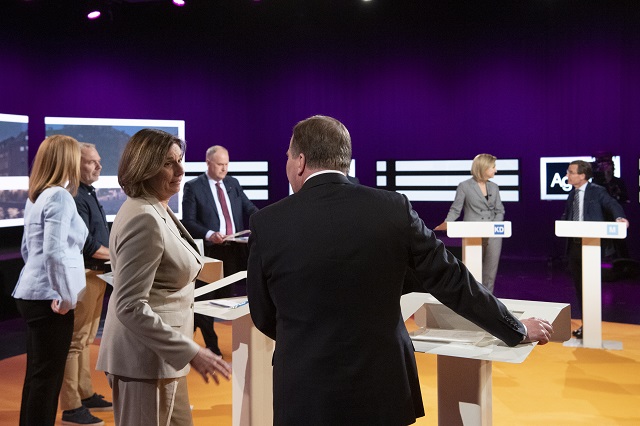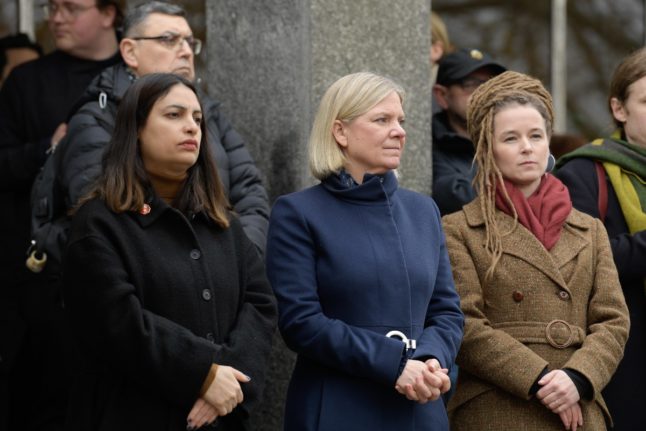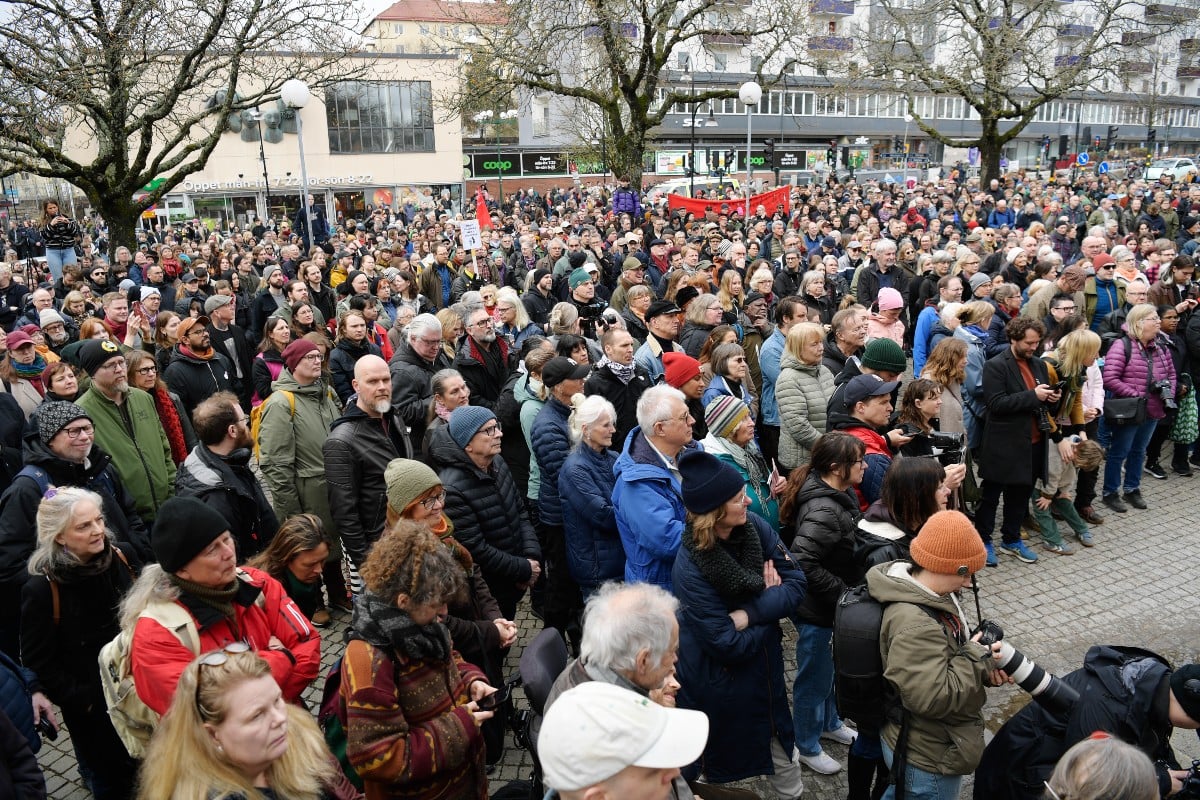This article was written for Members of The Local. Read more articles for Members here.
1. New political alliances
History was made in January when the centre-left Social Democrats and Green Party entered an agreement with their former opposition rivals, the Centre and Liberal parties, in order to get the support they needed to govern. The debate on May 5th was the first televised formal meeting of all the party leaders since this so-called January Deal (januariavtal in Swedish).
Previously, the Centre and Liberal party leaders stood alongside the leaders of the other two centre-right Alliance parties, the Moderates and Christian Democrats, and joined their centre-right allies in debating the leaders of the governing parties. But this time, Centre leader Annie Lööf was quick to defend the Social Democrats, at one point saying the centre-left budget allocated more cash to the legal system than the Moderate-Christian Democrat proposed budget.
Moderate leader Ulf Kristersson said as the debate opened that it felt strange not to be alongside his old Alliance partners, but added: “This is also the strangest government formation in Swedish history.”
Also participating in the debate were the leader of the far-right Sweden Democrats, Jimmie Åkesson, and Left Party leader Jonas Sjöstedt. Neither party is part of any alliance; another change from previous debates, when Sjöstedt stood alongside the Social Democrats and Greens, since his party worked with theirs on the budget.

From left, Stefan Löfven (Social Democrats), Isabella Lövin (Greens), Annie Lööf (Centre), Jan Björklund (Liberals), Jonas Sjöstedt (Left), Jimmie Åkesson (Sweden Democrats), Ebba Busch Thor (Christian Democrats), Ulf Kristersson (Moderates). Photo: Henrik Montgomery/TT
2. Law and order top of the agenda
Crime was the first topic the leaders discussed, with Prime Minister and Social Democrat leader Stefan Löfven opening the debate by saying the crime rate was too high, and that people needed to feel safe in Sweden.
Kristersson immediately went on the attack, saying the government “talks, but does almost nothing”. He called for tougher sentences, particularly for gang-related crime.
Löfven responded by saying his government had introduced tougher sentences for around 30 different crimes, and had led to an increasing number of police officers undergoing training.
READ ALSO:
- What Sweden's new budget means for internationals
- Foreigners in Sweden: How to vote in the EU election
- How Sweden's government deal has hit the popularity of political parties

Stefan Löfven is interviewed following the debate. Photo: Henrik Montgomery/TT
3. A controversial rape judgment
The leaders also discussed a recent Supreme Court judgment which ruled that a convicted rapist should not be deported from Sweden due to his ties to Sweden. As The Local reported at the time, the court has overturned a decision to deport the man after ruling there was no “extraordinary reason” to expel him from the country.
Christian Democrat leader Ebba Busch Thor was the one to bring up this judgment, challenging Green Party leader Isabella Lövin: “Why should foreign rapists who commit serious crimes be allowed to stay here?”
Lövin responded by saying that the Swedish legal system allows for criminals to be deported, without going into the details of the particular case. She also listed actions taken by the government against sexual violence, such as a new law on sexual consent, while Löfven said the government was working on a comprehensive strategy to reduce violence against women.
Annie Lööf said the parties were “in agreement” on the fact that more foreign criminals should face expulsion, and also said that violence against women was an area where Sweden “needs to do much more”.

Christian Democrat leader Ebba Busch Thor was critical of both the government and her former Alliance partners. Photo: Henrik Montgomery / TT
4. 'Ready to topple the government'
The leader of the Left Party repeated earlier threats made during the government-building negotiations that he was prepared to bring down the government over working conditions, if there was a deterioration in job security. Kristersson said the Moderate Party would be prepared to vote with the Left Party on a no-confidence motion in the government.
Löfven responded by saying: “If Sjöstedt thinks it would be easier with a Moderate-led government, he should do that.”

Left Party leader Jonas Sjöstedt speaking to media after the debate. Photo: Henrik Montgomery / TT
5. Climate debate
Most of the party leaders described the climate situation as “serious”, although the Sweden Democrats' Åkesson criticized them for acting on “panic” and “desperation”.
Left Party leader Jonas Sjöstedt replied: “It is a panic. It's a national and an international emergency situation.”
Annie Lööf meanwhile was critical of the flight tax, which was first introduced by the government during the previous term of office and has been reintroduced after a Moderate-Christian Democrat budget proposed scrapping it.

Sweden Democrat leader Jimmie Åkesson accused the other parties of “panic”. Photo: Henrik Montgomery / TT
6. But what about the EU elections?
One subject was conspicuous for how little it was touched on during the debate: the upcoming EU Parliamentary Elections.
These elections take place in just a few weeks on May, yet recent surveys have shown many Swedes are unaware of this. And it didn't appear to be the most pressing questions on the minds of party leaders, with the EU first mentioned at the 20-minute mark by Liberal Leader Jan Björklund, who proposed a European equivalent to the FBI.
Although the EU was brought up again in relation to immigration and integration, and during the section on climate, it was not mentioned at all during the discussion on jobs and welfare.




 Please whitelist us to continue reading.
Please whitelist us to continue reading.
Member comments